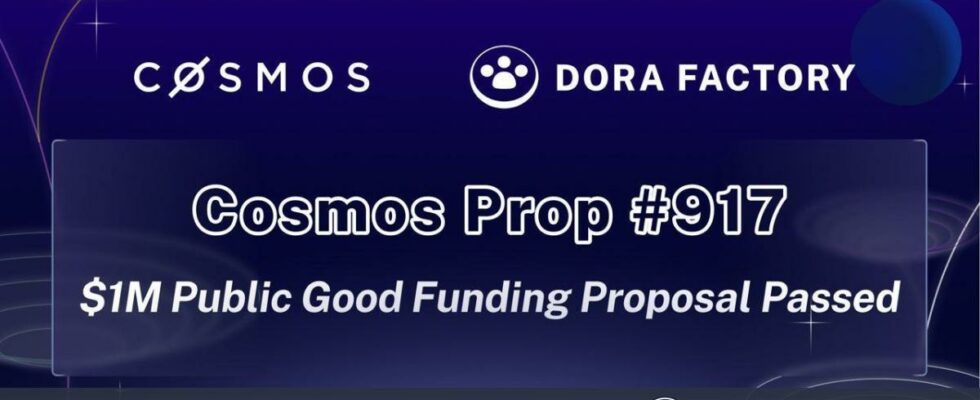Disclaimer: This content is a sponsored article. Bitcoinsistemi.com is not responsible for any damages or negativities that may arise from the above information or any product or service mentioned in the article. Bitcoinsistemi.com advises readers to do individual research about the company mentioned in the article and reminds them that all responsibility belongs to the individual.
A major event at Cosmos is the recent passage of Governance Proposal 917, Dora Factory and DoraHacks’ request for a $1 million grant from the Cosmos Hub community treasury. This grant will support ten rounds of Secondary Funding across the Cosmos Hub ecosystem over the next two years.

This proposal, one of the largest treasury funding applications, has sparked extensive discussion and received overwhelming support within the Cosmos community. Over $1 billion worth of ATOM voted in favor, including major validators and core Cosmos participants. The approval rating reached 91.9%, making Government Proposition 917 the motion with the highest approval rating in Cosmos Hub history.
Following the approval of this proposal, Dora Factory, in collaboration with DoraHacks, officially announced the second AEZ (ATOM Economic Zone) subordinated financing program, marking the launch of the first long-term financing initiative. This secondary funding program will run for two years, starting on May 15, 2024 and ending in May 2026.
The passage of Government Proposal 917 brings local Secondary Funding to the Cosmos Hub for the first time.
What is Public Goods Financing?
Public goods financing is a frequently discussed concept in the Web3 industry. In general, public goods refer to goods or services that are available to everyone.
In crypto, public goods can include blockchain infrastructure, storage, developer tools, software middleware, and user-facing applications such as block explorers, data dashboards, and wallets.
Due to their inherent transparency and verifiability, crypto and blockchain are ideal tools for financing public goods.
However, web3 public goods financing also faces numerous challenges.
- Lack of coordination among the various parties involved in financing public goods (foundations, institutions, DAOs, developers and communities).
- Lack of sustainable and effective financing mechanisms.
- Public goods financing is often perceived as uninteresting.
Enter Dora Factory, which is trying to create an infrastructure that enables the broad adoption of public goods financing.
Dora Factory: Born Infrastructure for Public Goods
Dora Factory is a leading decentralized governance infrastructure and multi-chain public goods funding protocol stack incubated and powered by DoraHacks, the industry’s developer and public goods funding platform. Its products include Public Domain Staking infrastructure and Dora Vota, a voting and governance implementation chain designed to empower the global Hacker Movement, open source communities, and DAOs.
Multi-Chain Quadratic Financing: Aligning Communities and Ecosystem Builders
What is Quadratic Funding? Through native token donations, token-holding communities can support high-quality early-stage projects and public goods in diverse ecosystems and foster better collaboration between foundations, communities, and developers.
As the first and only team in the industry to develop and advocate this approach, Dora Factory is a true leader in multi-chain quadratic funding. BNB Chain has successfully implemented native quadratic funding across multiple mainstream crypto ecosystems, including Solana, Polygon, Aptos, Cosmos Hub, Injective, and Avalanche.
Public Goods Staking: Providing Sustainable Financing for Public Goods
In late 2022, Dora Factory introduced the concept of Public Domain Staking. By operating underlying infrastructures such as validators, they earn local block rewards that are constantly used to fund multi-chain developers and public goods ecosystems.
By promoting public domain staking on the mainnet and testnet of over 30 ecosystems, Dora Factory has achieved a TVL (Total Value Locked) of over $400 million and generated sustainable annual funding of up to $10 million.
In the future, Dora Factory will explore ways to use cryptocurrency to finance cutting-edge fields such as space technology, quantum computing, artificial intelligence and biomedical research.
Community Incentive Fund: Making Public Goods Financing More Fun
Dora Factory launched the Community Incentive Fund to make the public goods funding process more interesting and fun. Top meme and NFT projects such as Celestia’s Celestine Sloth Collection, Injective Ninja, Aptos Gui Inu and Aptos Monkeys became partners of the Community Incentive Fund. Thanks to retroactive airdrops and gamified donations, these projects brought more fun to public goods financing by receiving contributions and donations from nearly 100,000 unique addresses in different communities.
Anonymous Minimum Anti-Collusion Infrastructure (aMACI): Bringing Privacy Technology to On-Chain Public Goods Governance
MACI is a cryptographic technology designed to maximize the detection and elimination of collusion in voting. The Dora Factory team introduced privacy voting to crypto hackathons in 2022 and 2023, collaborating with ETHDenver, 0x, and OpenSea. MACI significantly improved privacy and reduced collusion in on-chain governance and voting.
In 2024, Dora Factory launched aMACI, adding voter anonymity to eliminate collusion between the voting initiator and the operator. This further increases privacy and lowers the threshold for using MACI voting. This is an important step towards future large-scale decentralized voting systems.
Dora Vota: Open Infrastructure for Public Goods Financing
Dora Vota is a multi-chain governance and voting infrastructure. It will provide modular voting and governance infrastructure such as interoperability protocols such as Vota and IBC, plug-and-play quadratic funding modules and grant distribution mechanisms. As the first permissionless app chain focused on scaling on-chain voting, Dora Vota will unlock more possibilities for public goods financing and decentralized community governance, providing developers with a valuable playground.
It recently secured strategic funding from angel investors including Dora Factory, dao5, Whampoa Digital, and EigenLayer co-founder Calvin Liu. This is the first strategic round of a new round of financing since Dora Factory’s $17.5 million raise in 2021.
The team believes that as Dora’s Public Domain Staking grows and Vota’s ecosystem matures, Dora Factory will continue to explore new solutions to traditional financing inefficiencies and accelerate the maturity of governance and public domain financing in the multi-chain ecosystem.
